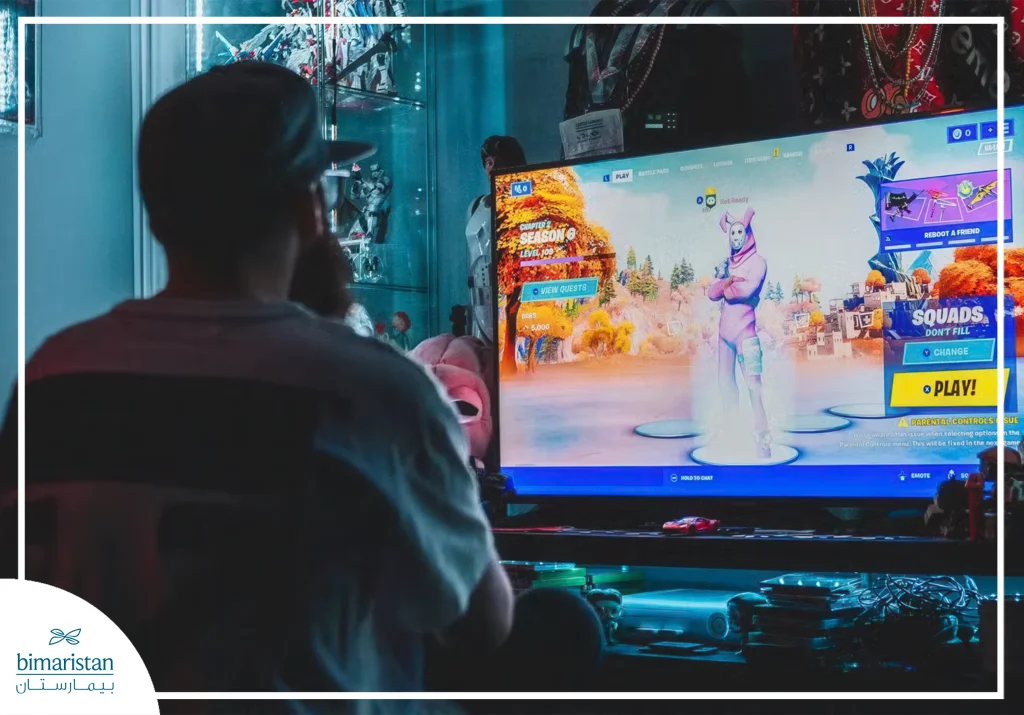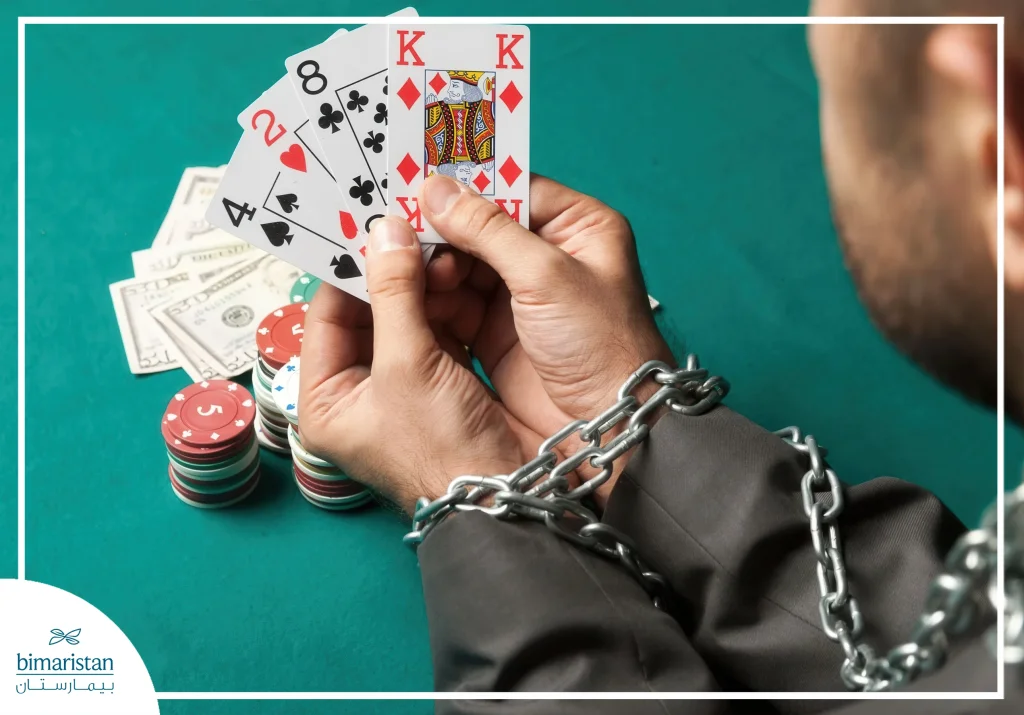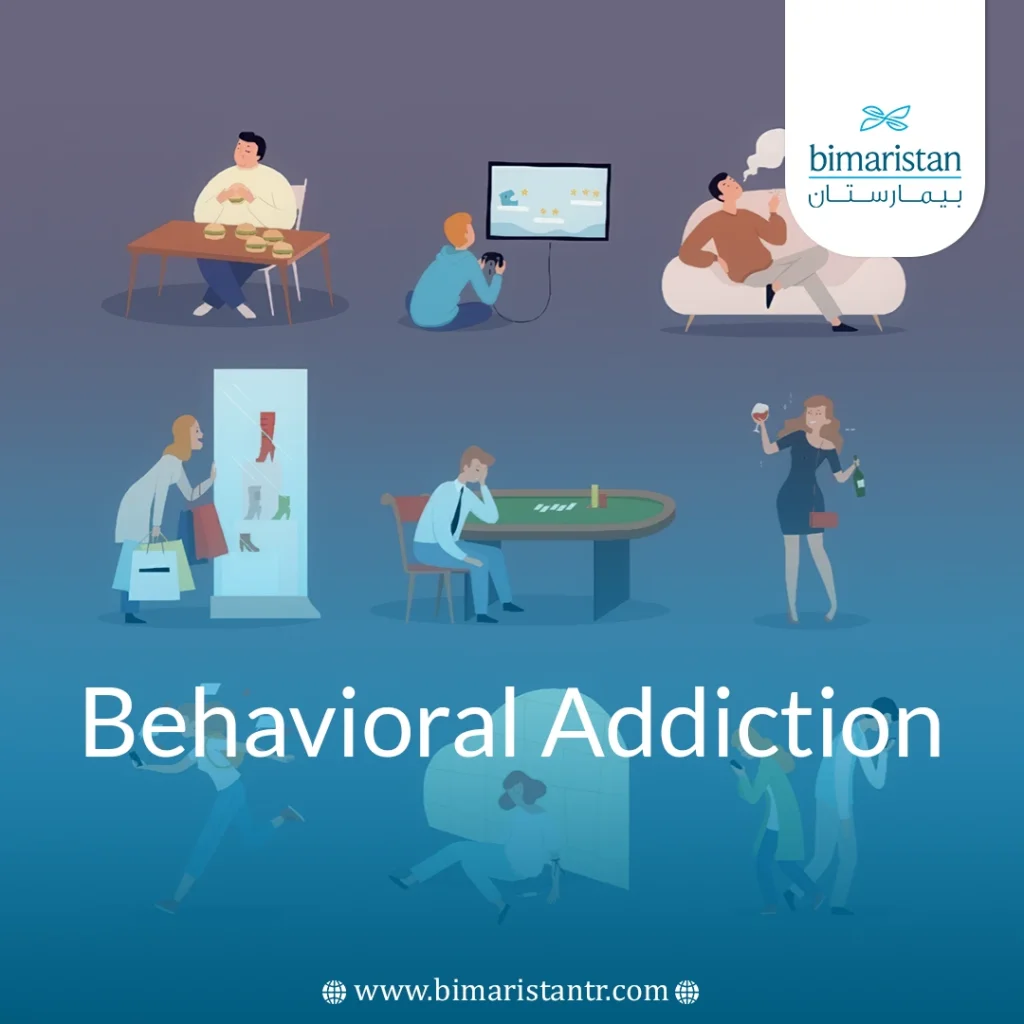Behavioral addiction is a growing psychological phenomenon that affects the lives of individuals significantly, as it leads to a loss of control over certain behaviors despite the obvious damage resulting from them, and this addiction causes deep psychological and social effects that extend to health, relationships and daily performance, so recognizing its symptoms and early diagnostic methods is a crucial step towards applying the appropriate treatment, which contributes to restoring psychological balance and improving the quality of life.
What is behavioral addiction?
Behavioral addiction is also known as process addiction or impulse control disorder, which is the compulsive insistence on continuous engagement in a specific activity or behavior, where a person feels a strong desire to repeat a specific act that is enjoyable or believed to improve his sense of well-being or able to relieve some of his personal stressors, and behavioral addiction is characterized by the difficulty that affected people face in stopping or reducing participation in addictive behaviors despite the negative impact on his ability to maintain his mental or physical health or even both, as well as his job performance within the home and society.
The difference between behavioral and substance addiction
In general, the concept of any addiction is based on dependence on a particular activity or substance, and behavioral addiction is similar to drug or alcohol addiction, but the difference between them is that an individual who is addicted to a certain behavior is not addicted to a specific substance, but rather becomes addicted to the behavior or feeling resulting from the execution of this behavior, and the compulsive nature of this behavior is what usually indicates the presence of behavioral addiction (process addiction) in the individual.
The person may find the behavior psychologically rewarding or feel euphoric while engaging in it, but may later experience feelings of guilt, remorse, or even burnout as a result of the consequences of continuing the choice.
Unfortunately, as with all addictions, people with behavioral addictions are unable to stop engaging in the behavior for long periods of time without appropriate treatment and intervention.
How does behavioral addiction occur psychologically and brain-wise?
Generally speaking, behavioral addictions are brain issues, which means we must let go of the social stigma associated with them. They are not moral failures or signs of weakness, but rather the result of unhealthy brain activity patterns. Based on a database of more than 250,000 SPECT brain scans, six brain addiction patterns have been identified:
- Compulsive addicts: They tend to be attached to obsessive thoughts, focusing on a single course of action and finding it difficult to shift their attention. This type is associated with increased activity in the anterior cingulate sulcus of the brain, often due to low levels of serotonin.
- Impulsive addicts: are driven by low activity in the prefrontal cortex (prefrontal cortex – PFC), often due to low levels of dopamine. Low PFC activity leads to boredom, distraction, and difficulty controlling impulses. This type is more common among people with ADHD and males in particular.
- Compulsive impulsive addicts: Combining the two previous types, SPECT images show low activity in the prefrontal cortex with excessive activity in the anterior cingulate sulcus; this pattern is often seen in the children and grandchildren of alcoholics.
- Sad or emotional addicts: Use behaviors such as compulsive eating as a means of self-medication. They may experience feelings of depression, boredom, or loneliness. This type, more common in women, shows increased activity in the deep limbic system with reduced activity in the prefrontal cortex.
- Anxious addicts: They also use self-medication, but their primary emotions are anxiety, tension, nervousness, and fear, and they may exhibit physical symptoms such as rapid heartbeat and muscle tension, and psychological symptoms such as excessive shyness. Their SPECT images show excessive activity in the basal ganglia, often associated with low GABA levels.
- Temporal lobe addicts: They exhibit abnormal activity in the temporal lobes, which may be the result of a head injury, infection, toxin exposure, or genetic factors. Common symptoms include issues with anger management, learning, memory, and mood swings.
Main types of behavioral addictions
Behavioral addictions take many forms, each of which triggers the need to engage in the behavior to get rid of obsessive thoughts and deal with difficult emotions. The list of behavioral addictions is long and still growing, and some of the common types of behavioral addictions may include the following:
Internet addiction
The term Internet addiction refers to a person’s compulsive use of the Internet to the point that it becomes an issue that negatively affects his or her life. Internet addiction is on the rise, as this definition applies to 5% of people around the world, and this percentage is higher among adolescents and young people, where it may reach 10-15% according to some studies. Internet addiction disorder is characterized by prolonged time spent on non-work-related technological activities, mood changes, preoccupation with digital media, withdrawal symptoms when stopping, and persistent behavior despite issues at work, home, school, or social life.
Video Game Addiction
Gaming addiction is a compulsive need to play online or computer games repeatedly with other players despite its negative effects on a person’s life. Gaming addiction is also known as Internet Gaming Disorder or pathological gaming, and as with all addictions and behavioral addictions, the World Health Organization classifies gaming addiction as a mental health disorder, meaning that it is a serious issue that may cause negative consequences on the addicted person’s life if not treated properly.

Gambling addiction
Gambling addiction, also known as problem gambling or gambling disorder, is an addiction that involves all types of gambling or gambling-related choices that jeopardize or harm a person’s life, work, or family. Gambling addiction is characterized by behaviors such as betting more frequently or betting larger amounts than planned, attempting to make up for losses by continually betting despite not being able to pay, feeling stressed or aggressive when unable to play or when losing, and a constant preoccupation with gambling.

Shopping addiction
Compulsive buying or shopping dependency, also known as shopping addiction, is characterized by excessive financial investments that cause the individual significant distress or dysfunction. Experts sometimes categorize this disorder within impulse control disorders or within the spectrum of obsessive-compulsive disorders, where people drift towards irresistible impulses and are preoccupied with buying repeatedly, but feel uncomfortable and suffer negative financial and social consequences and waste of time.

There are other less common types of the above-mentioned types that need to be mentioned:
- Social media addiction
- Pornography addiction
- Exercise addiction
- Conspiracy Theory Addiction
- Smartphone Addiction
- Food Addiction
- Plastic surgery addiction
- Relationship addiction
- Workaholism
- Love addiction
- Sugar addiction
Common signs and symptoms of behavioral addiction
Each type of behavioral addiction has its own signs and symptoms, but there is a set of common core symptoms that, when present, indicate behavioral addiction:
- Preoccupation with thoughts about the activity and when it can be done next continuing with the behavior or activity despite any adverse consequences resulting from the behavior
- Neglecting important areas of one’s life, such as work or relationship,s as well as social and emotional withdrawal
- Feeling guilty or ashamed of their behavior, but unable to stop it
- Lying about or hiding behaviors to continue them
- Feeling out of control and finding it difficult to stop the behavior
- Behavioral and mood changes
So if any of the listed symptoms are highly recurring for you or someone close to you, you can reach out to us for treatment advice or click on the specific addiction above for more support and guidance.
Behavioral addiction causes many effects and issues that may affect the addict’s psyche and social life, including:
- Problems with interpersonal relationships: Withdrawal from family and friends, and difficulty building healthy relationships due to preoccupation with addictive behavior
- Occupational and educational issues: Significant reduction in academic or job performance due to excessive preoccupation with behavior
- Social isolation: Feeling lonely and isolated as a result of addiction and staying away from social activities
- Anxiety and depression due to loss of control over behavior and negative impact on daily life
- Low self-esteem as a result of repeated failure to control behavior or being criticized
- Severe mood swings such as nervousness, irritability, or constant frustration
Methods of psychological diagnosis and assessment
As with substance use disorders, there are often co-occurring disorders associated with behavioral addiction that may affect an individual’s compulsive behavior and ability to remain abstinent in recovery. A comprehensive psychological assessment can help identify any comorbid issues related to mental health disorders that may contribute to, cause, or in any way influence an individual’s experience with behavioral addiction. Methods for diagnosing and psychiatric evaluation of behavioral addiction are based on:
- Clinical and psychological interviews: This involves conducting in-depth interviews with the patient to assess their behaviors, thoughts and feelings related to the addiction and uncover the underlying psychological factors contributing to the occurrence of addiction such as anxiety, depression, impulse control disorders and any other psychological disorders that may accompany the addiction, as well as to assess the extent to which the addiction affects social, professional and family functions.
- Validated assessment tools: There are specialized scales for each type of behavioral addiction (such as gambling addiction, gaming addiction, or others) that are used to assess symptoms and their impact on the patient’s life and help determine the degree and severity of behavioral addiction through a set of structured questions, such as using reliable standardized scales such as the Young Internet Addiction Scale.
- Behavioral observation and following the patient’s behavior over a period of time to assess the frequency, severity, and consequences of the addictive behavior.
Behavioral addiction treatment methods
Although behavioral addiction can have serious consequences, effective treatment is available, but it requires a strategic treatment plan that relies on identifying the type of behavioral addiction and its causes to ensure the most effective treatment. Intensive and comprehensive treatments help curb these behaviors, allowing those suffering from behavioral addiction to regain their normal lives. Strategies that may help overcome behavioral addiction include:
Cognitive Behavioral Therapy (CBT)
Cognitive behavioral therapy (CBT) is a form of psychotherapy that helps people understand how their thought patterns affect their behaviors. Used to treat a number of disorders, including behavioral and substance abuse addictions, CBT focuses on identifying and changing abnormal thoughts to modify negative emotions and behaviors, includes coping skills training, and teaches addicts how to manage their minds to improve their control over their actions and resolve issues resulting from their addiction.
Group therapy and social support are effective methods of treating behavioral addiction, as they provide a safe environment where individuals can share their experiences and challenges. Group therapy for behavioral addiction aims to help individuals overcome compulsive behaviors similar to substance abuse, often using support group models (such as 12-step programs) and cognitive behavioral therapies that focus on changing thought patterns to modify behaviors. Participants in group therapy benefit from sharing experiences, which contributes to reducing feelings of isolation and denial, two key barriers in recognizing and treating addiction. Social support from friends and family also plays an important role in promoting recovery and sustained improvement, helping individuals cope with relapses and motivating them to continue with positive change.

The role of adjunctive medications and supplements (if needed)
Medications may be helpful for some people in accelerating recovery from behavioral addiction and managing symptoms, such as antidepressant or anti-anxiety medications if there are comorbid disorders, and taking brain-oriented supplements may help improve brain function, e.g., 5HTP which boosts serotonin levels in the brain for compulsive types, stimulant supplements such as rhodiola or green tea extract for impulsive types, saffron for emotional types, GABA for anxious types and magnesium for temporal lobe types, but these supplements are not primary treatments approved in clinical psychiatric protocols, but rather supportive supplements when needed after consulting a specialist doctor.
Behavioral addiction and other mental health issues cannot wait. Fortunately, you can regain control of your actions and overcome behavioral addiction with these treatment strategies, so don’t hesitate to seek our medical help if necessary.
How do specialized mental health centers help treat behavioral addiction?
Specialized mental health centers provide effective and continuous treatment for behavioral addiction and relapse prevention. The psychiatrist offers an accurate diagnosis of the type of behavioral addiction and provides appropriate treatment, such as cognitive behavioral therapy to change addictive thoughts and behaviors, along with medication if needed. Rehabilitation and social reintegration programs are also essential, including individual and group psychotherapy sessions that help addicts overcome psychological stressors, control impulses, develop alternatives to addictive behaviors, improve communication skills, and build healthy relationships.
Specialized mental health centers for the treatment of behavioral addiction also offer long-term follow-up through regular appointments or support sessions, aiming to prevent relapse, boost self-confidence, and help patients maintain positive changes in their lives.
Can behavioral addiction be prevented?
Behavioral addiction can be prevented and reduced by controlling the behaviors that may cause it and not exaggerating them:
- The family plays a key role in preventing behavioral addiction by providing a supportive environment, promoting open communication, and educating children about the dangers of addictive behaviors. Schools also contribute to spreading awareness programs aimed at teaching children self-awareness and decision-making skills, which reduces the likelihood of behavioral addiction.
- Developing people’s psychological coping skills, stimulating positive thinking, and teaching them how to deal with psychological pressures and life challenges in a healthy way helps reduce the resorting to addictive behaviors as a way to escape or relieve stress.
- Control the digital environment and regulate the use of technology and digital media by setting time limits for use, selecting appropriate content, and providing healthy activity alternatives that encourage real social interaction.
Finally, if you are facing the challenges of behavioral addiction or seeking to prevent it, don’t let it fester without intervention. Early awareness and specialized treatment are the key to regaining control of your life and achieving the desired psychological and social balance. Specialized mental health centers provide integrated treatment programs for behavioral addiction that include individual and group sessions, psychological rehabilitation, and ongoing follow-up to ensure continued recovery. Don’t let behavioral addiction steal your chances of success and happiness—start taking the right steps today.
Sources:
- Grant, J. E., Potenza, M. N., Weinstein, A., & Gorelick, D. A. (2010). Introduction to behavioral addictions. The American Journal of Drug and Alcohol Abuse, 36(5), 233-241.
- Addiction Center. (n.d.). Behavioral addictions. Retrieved May 27, 2025, from
